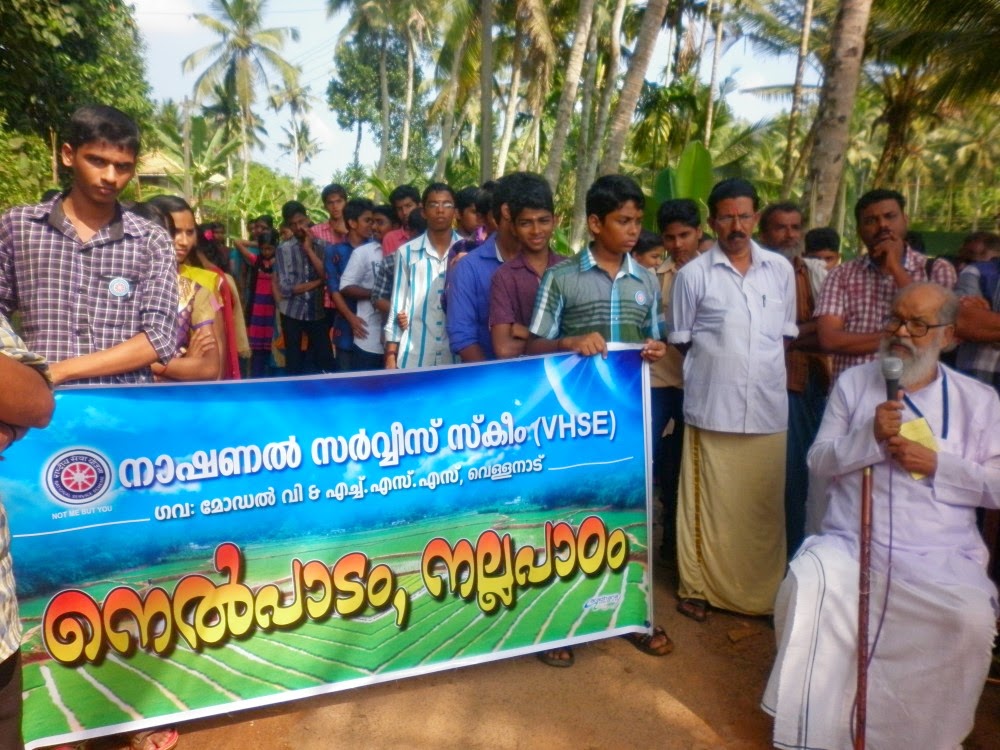Organic Vegetable Farming
 The unit started organic vegetable farming during the first week of
July. It was decided to do the farming in discarded rice sacks,
thereby promoting the slogan of reusing plastics.
The unit started organic vegetable farming during the first week of
July. It was decided to do the farming in discarded rice sacks,
thereby promoting the slogan of reusing plastics.
The roof of the school library was selected as the location. The
volunteers cleaned the roof and prepared the roof top garden space.
Farming started with 10 bags, planted with seeds of cheera, payar,
and venda. The volunteers are engaged daily in the maintenance of the
vegetable garden, with the duty given to them group-wise weekly.
June 5 – Environment Day
 Environment day was celebrated extensively in our school. The day
started with a special assembly where the school principals,
headmaster, and the PTA president reminded of the need for
maintaining greenery through planting more trees.
Environment day was celebrated extensively in our school. The day
started with a special assembly where the school principals,
headmaster, and the PTA president reminded of the need for
maintaining greenery through planting more trees. The VHSE NSS unit took up the responsibility of improving the
greenery of the school campus. They had prepared the pit for planting
3 saplings in front of the school building, where the planting was
done by the PTA president and the school heads.
The VHSE NSS unit took up the responsibility of improving the
greenery of the school campus. They had prepared the pit for planting
3 saplings in front of the school building, where the planting was
done by the PTA president and the school heads.
A group of ex-NSS volunteers donated some saplings to the school during the occasion,
Each volunteer was given five saplings each to be planted in their
homes.
June 12 – International Day Against Child Labour
The NSS volunteers commemorated this day by exhibiting posters to
create awareness on the issue. This work was taken up by a group of
volunteers and they created very informative posters on the topic.
June 19 – Reading Day
 The contributions of Sri. P. N. Panicker to Malayalam language is
observed as Reading Day every year on June 19. In our school, the NSS
unit carried out a week long observation through various activities.
The contributions of Sri. P. N. Panicker to Malayalam language is
observed as Reading Day every year on June 19. In our school, the NSS
unit carried out a week long observation through various activities.
Another activity of the volunteer group gathered praise from all. A
set of 3 questions were announced through the public address system
of the school in the morning, and the students could drop their
answers into a drop box by afternoon. By evening, the names of three
students who answered all questions correctly were announced and
given prizes. This went on daily for the entire week. All the
activities helped to increase awareness on the necessity of reading
and gathering knowledge.
June 21 – International Day for Yoga
A group of five volunteers attended the district-wise programme held
at Govt HSS Kumarapuram. The volunteers arrived early at the venue
and took part in the yoga practice wholeheartedly. It was an
enriching experience for them regarding the lifestyle that yoga is.
Later on back in the school, they transferred their knowledge and
explained the advantages of yoga to the other volunteers.












.jpg)






